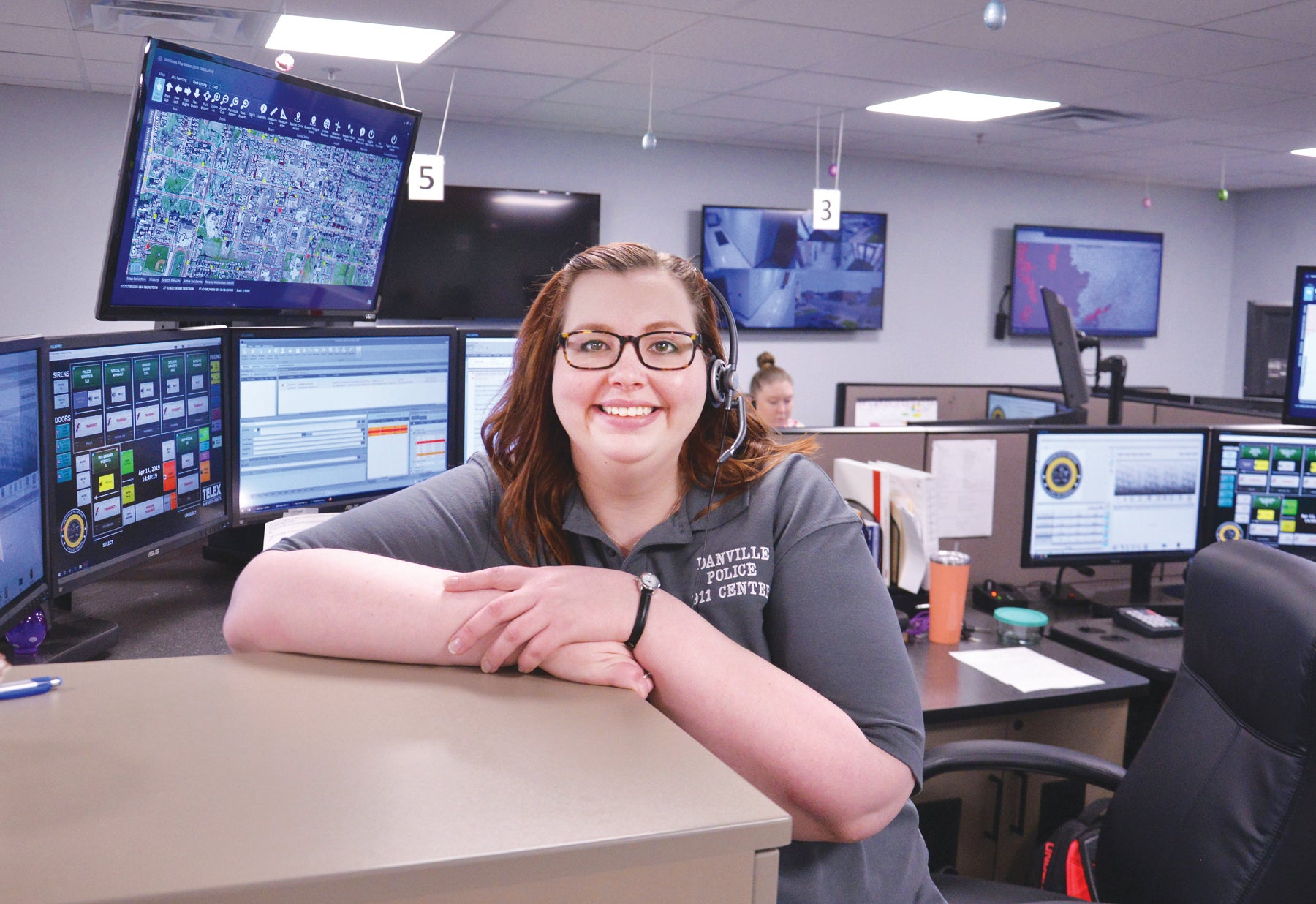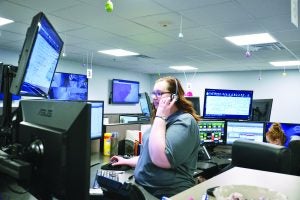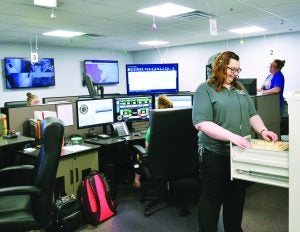Dispatcher enjoys tough job because she gets to help people
Published 7:13 pm Tuesday, April 16, 2019

- Jayla Pennycuff is a dispatcher at Danville Police Department's 911 center. Photo by Robin Hart.
Editor’s note: This week’s One Day features a local 911 dispatcher in honor of National Public Safety Telecommunicators Week.
Jayla Pennycuff is one of the local 911 dispatchers tucked away behind locked doors in the basement of Danville City Hall. The high-tech room where dispatchers receive emergency calls and send first responders to help is dimly lit, but the glow of five large computer screens surrounding each dispatcher at their individual stations cause their faces to glow.
Pennycuff said they keep the lights dim because it’s easier on their eyes.
A large screen on the wall in front of Pennycuff projects security camera footage from several positions around the exterior of city hall and the police department. Another one shows a weather map of the area.
All of a sudden, a loud siren blasts in the room. Pennycuff smiles and says that’s what a 911 call sounds like when it comes into the dispatch center — not a regular telephone ring.

Pennycuff answers a call, one of many she will rercieve during her shift. Photo by Robin Hart.
“Every call we answer helps somebody. Every time you hear the phone ring, you get ready because you don’t know if it’s going to be a noise complaint, or a fender bender, or car wreck where someone’s been ejected out of the car, or trapped. … It could be someone’s gotten shot,” Pennycuff says.
“No one ever calls 911 because they’re having a good day,” she says. “There are a lot of places where you can work where you don’t feel like you’re helping somebody. … But here, I know I am.”
Pennycuff has worked at the Danville-Boyle County 911 center for nearly two and a half years. It takes nearly six months of intense testing and interviewing before being hired, she says. They also undergo a psych evaluation, a polygraph test, background check and drug testing. Then, dispatchers go through police academy training in Richmond for five weeks, then four months of training here. Dispatchers are also certified in CPR and first aid as part of their basic telecommunicator certification. Local dispatchers also keep up with training on using the EMD system that was recently enacted here.
“We do all this and people don’t realize that we don’t just sit down here and answer phones. If you’re calling me because somebody’s not breathing, I want to do the best I can.”
911 dispatchers are the very first contact for first responders, Pennycuff says. Yet they are classified as clerical workers. However, that may change if the 911 Saves Act is made into law, which will reclassify them as first responders.
“My very first 911 call was a heroin overdose and he wasn’t breathing. He was at his parents’ house and had overdosed,” Pennycuff recalls.
“I listened to his dad give him CPR while his mom sat on the phone and cried with me.”
“I couldn’t tell you to this day whether he lived or not. That’s the worst part of the job. We don’t always know if they survived.”
“On my first or second Christmas here, we had taken two or three child abuse calls on one day. I don’t know what happened to those kids. I don’t know if they went home with people that hurt them or they were put with families that loved them,” Pennycuff says. “That’s the stuff that goes home with you.”
“I had a call where a child did die, and there was nothing anybody could have done at all.” Pennycuff talked with co-workers about the situation and how she felt about the tragedy. “You always go back and think, could I have done something faster, quicker, better?” That’s why dispatchers take their training so seriously, Pennycuff says.
“You don’t want to have to think about that. You want to know you did everything you could. And I know in that case I had done everything I could. I know 100 percent without a doubt that I had done everything that I could have,” she says. “That’s part of it. You train. You do your best and you go home feeling good that you tried. … It takes a special set of skills to do this job.”

Jayla Pennycuff, far right, searches for an outstanding warrant as other 911 dispatchers wait for calls. Photo by Robin Hart.
Pennycuff says a survey she read showed that about 25 percent of dispatchers suffer from post-traumatic stress disorder.
“You don’t think about it because we don’t see things like officers or firemen or EMS,” she says, but dispatchers still deal with things like being on a 911 call when a wife is holding her dying husband. “That’s the part we can get PTSD from.”
Having a nosy personality and natural curiosity about every call serves Pennycuff well, she says. “It’s good to ask detailed questions to clarify for my first responders. Everything we ask is always for their safety.”
For example, if someone calls and says they’re fighting with their ex-husband, she asks questions like, “Is there yelling? Is he hitting you? Or has he texted you and you’re fighting over a text message?” Pennycuff said. “It makes a difference.”
During a medical emergency, if a patient is having chest pains and trouble breathing, it’s important for EMS to know which affliction started first, Pennycuff said. It could be an asthma attack then their chest started to feel tightened. Or, a heart attack when chest pain started first which caused trouble breathing.
“Little things like that make a difference,” Pennycuff said.
Pennycuff said she’s had two calls where women were in labor. One of them was home alone and EMS arrived within four minutes of the call. “I am so thankful EMS got there so fast. They got there in time to catch it.”
One call Pennycuff answered frightened her. Two young women were hiding in a closet because they thought there was an intruder in the home. “They were just terrified. It ended up not being a burglary, but her trying to whisper to me. It really gets to you. The adrenaline comes up, you want to make sure they (law enforcement) get there before something happens.”
You come here because you want to help people,” Pennycuff says. “But you stay because it’s fun.”




